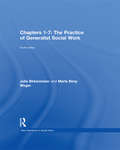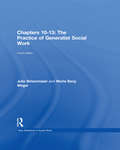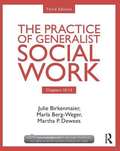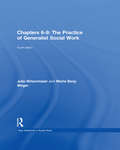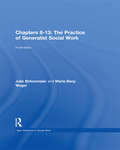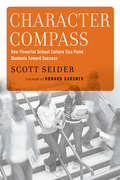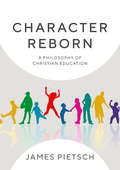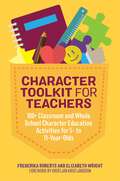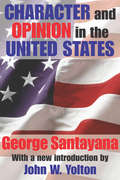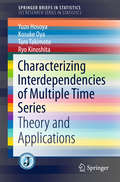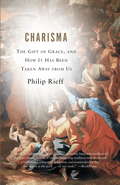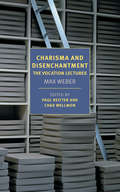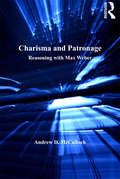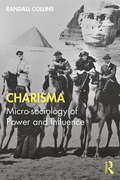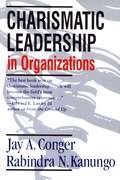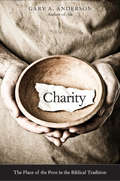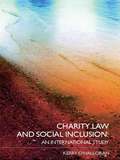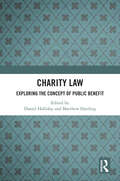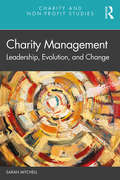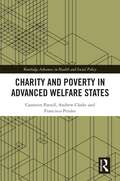- Table View
- List View
Chapters 1-7: The Practice of Generalist Social Work
by Marla Berg-Weger Julie BirkenmaierThe fourth edition of?The Practice of Generalist Social Work?continues to teach students to apply micro, macro, and mezzo social work skills. This new edition strengthens the connection between the three levels of practice and is fully updated to the 2015 EPAS. This edition also contains more illustrations of theory and more context for deciding which type of intervention is a good fit. Most chapters now open with a case study and continually refer back to the case to provide additional connections between theory and real-life practice. Each chapter also incorporates a link to a Grand Challenge of Social Work from the American Academy of Social Work and Social Welfare, which shows the connection between social work and the most significant societal challenges of today. The Quick Guides within the text offer students guidance for their field experience and practice after graduation. The text also comes with a rich companion website that includes support materials and six unique cases that encourage students to learn by doing. Go to?www.routledgesw.com to explore the cases and additional resources.
Chapters 10-13: The Practice of Generalist Social Work
by Marla Berg-Weger Julie BirkenmaierThe fourth edition of?The Practice of Generalist Social Work?continues to teach students to apply micro, macro, and mezzo social work skills. This new edition strengthens the connection between the three levels of practice and is fully updated to the 2015 EPAS. This edition also contains more illustrations of theory and more context for deciding which type of intervention is a good fit. Most chapters now open with a case study and continually refer back to the case to provide additional connections between theory and real-life practice. Each chapter also incorporates a link to a Grand Challenge of Social Work from the American Academy of Social Work and Social Welfare, which shows the connection between social work and the most significant societal challenges of today. The Quick Guides within the text offer students guidance for their field experience and practice after graduation. The text also comes with a rich companion website that includes support materials and six unique cases that encourage students to learn by doing. Go to?www.routledgesw.com to explore the cases and additional resources.
Chapters 10-13: The Practice of Generalist Social Work, Third Edition
by Marla Berg-Weger Julie Birkenmaier Martha P. DeweesThis text for generalist practice courses is also available with a treasure trove of related materials for use in a two or three-course practice sequence. The text helps translate the guiding theoretical perspectives of social justice, human rights, and critical social construction into purposeful social work practice. Six unique cases, specially written for this Series, provide a "learning by doing" framework unavailable from any other social work publisher. Companion readings and many other resources enable this text to be the centerpiece for three semesters of practice teaching. Go to www.routledgesw.com to learn more. This custom edition includes chapters 10-13 for instructors teaching the third semester of a three-semester generalist practice sequence, and is also available in e-book editions in a full range of digital formats.
Chapters 6-9: The Practice of Generalist Social Work
by Marla Berg-Weger Julie BirkenmaierThe fourth edition of?The Practice of Generalist Social Work?continues to teach students to apply micro, macro, and mezzo social work skills. This new edition strengthens the connection between the three levels of practice and is fully updated to the 2015 EPAS. This edition also contains more illustrations of theory and more context for deciding which type of intervention is a good fit. Most chapters now open with a case study and continually refer back to the case to provide additional connections between theory and real-life practice. Each chapter also incorporates a link to a Grand Challenge of Social Work from the American Academy of Social Work and Social Welfare, which shows the connection between social work and the most significant societal challenges of today. The Quick Guides within the text offer students guidance for their field experience and practice after graduation. The text also comes with a rich companion website that includes support materials and six unique cases that encourage students to learn by doing. Go to?www.routledgesw.com to explore the cases and additional resources.
Chapters 8-13: The Practice of Generalist Social Work
by Marla Berg-Weger Julie BirkenmaierThe fourth edition of?The Practice of Generalist Social Work?continues to teach students to apply micro, macro, and mezzo social work skills. This new edition strengthens the connection between the three levels of practice and is fully updated to the 2015 EPAS. This edition also contains more illustrations of theory and more context for deciding which type of intervention is a good fit. Most chapters now open with a case study and continually refer back to the case to provide additional connections between theory and real-life practice. Each chapter also incorporates a link to a Grand Challenge of Social Work from the American Academy of Social Work and Social Welfare, which shows the connection between social work and the most significant societal challenges of today. The Quick Guides within the text offer students guidance for their field experience and practice after graduation. The text also comes with a rich companion website that includes support materials and six unique cases that encourage students to learn by doing. Go to?www.routledgesw.com to explore the cases and additional resources.
Character Compass: How Powerful School Culture Can Point Students Toward Success
by Howard Gardner Scott SeiderIn Character Compass, Scott Seider offers portraits of three high-performing urban schools in Boston, Massachusetts that have made character development central to their mission of supporting student success, yet define character in three very different ways. One school focuses on students' moral character development, another emphasizes civic character development, and the third prioritizes performance character development. Drawing on surveys, interviews, field notes, and student achievement data, Character Compass highlights the unique effects of these distinct approaches to character development as well as the implications for parents, educators, and policymakers committed to fostering powerful school culture in their own school communities.
Character Compass: How Powerful School Culture Can Point Students Toward Success
by Scott Seider2013 American Educational Research Association's (AERA) Moral Development and Education Outstanding Book Award In Character Compass, Scott Seider offers portraits of three high-performing urban schools in Boston, Massachusetts that have made character development central to their mission of supporting student success, yet define character in three very different ways. One school focuses on students&’ moral character development, another emphasizes civic character development, and the third prioritizes performance character development. Drawing on surveys, interviews, field notes, and student achievement data, Character Compass highlights the unique effects of these distinct approaches to character development as well as the implications for parents, educators, and policymakers committed to fostering powerful school culture in their own school communities.
Character Reborn: A Philosophy of Christian Education
by James PietschMore than one million students in Australia attend schools founded by churches and other Christian organisations.What is it that sets these schools apart?More importantly, what is it that should set these schools apart?In Character Reborn, James Pietsch offers a fresh examination of the unique capacities and opportunities of Christian schools in Australia today.More than ever before, Christian schools are a significant point of contact between Christian communities and those with little or no understanding of the Christian worldview. Dr Pietsch challenges Christian educators to consider how they might maximise their opportunities to share the good news of Jesus with this wider community that is drawn to Christian schooling. To this end, he sets out an approach to education that focuses on learning character, whereby students in the Christian school context experience and practise the values of the kingdom of God – grace, compassion, kindness, and humility – as integral to their development, whatever their religious or cultural background.This book presents an inspiring blueprint for building up today’s students as people of Christian character – preparing them for the challenges of the current age and giving them insight into the age to come.
Character Toolkit for Teachers: 100+ Classroom and Whole School Character Education Activities for 5- to 11-Year-Olds
by Kristján Kristjánsson Elizabeth Wright Frederika RobertsThis accessible and much-needed resource sets out advice on how to develop character and encourage wellbeing in pupils aged 5-11. Schools are increasingly aware of how beneficial positive character skills can be, but resources on how to develop them are scarce. This book gives teachers the means to promote gratitude, positive emotions, character strengths, and positive relationships through 100+ easy-to-implement activities such as student diaries, classroom displays and letter writing campaigns. It also includes tools and strategies that go beyond the classroom, helping to embed character education into the culture and ethos of the entire school. Each chapter will include a short introduction to the relevant theoretical background, and all activities are based on validated character education and positive psychology interventions. Bite-sized and practical, and full of ideas that can be dipped in and out of in the classroom, this is an ideal book for busy teachers.
Character and Opinion in the United States: With Reminiscences Of William James And Josiah Royce And Academic Life In America (1921)
by George SantayanaGeorge Santayana was one of the most influential twentieth-century philosophers. Because of his broad-ranging interests and lack of any permanent home in one particular country, he has often been stereotyped as a meditative philosopher removed from the world, living in what he himself called the "realm of spirit" among eternal essences. While there is some truth in this characterization, it is also true that Santayana was a penetrating analyst and critic of contemporary societies.'Character and Opinion in the United States' is his comprehensive critique of American thought and civilization and reflects the detached cosmopolitan perspective that lent his criticism its characteristic objectivity and strength. Santayana's subject here is the conflict of materialism and idealism in American life. In his view there exists a dualism in the American mind: One side, dealing with religion, literature, philosophy, and morality, tended to stay with inherited, old doctrines-the genteel tradition-and failed to keep pace with the other, practical side and its new developments in industry, invention, and social organization. Santayana traces the first mentality to Calvinism and its sense of sin, an attitude out of keeping with a new civilization and the dominance of practical interests. As a consequence of separating philosophy from everyday life, its study merely served religious and moral interests cut off from the free search for truth. At the heart of the book is Santayana's examination of the influential thought of William James and Josiah Royce, who typified for him the dilemma of American thought. The subordination of thought to social form and custom underlies Santayana's sharp critique of academic philosophy at Harvard where he early on studied and taught. He was disturbed by the very idea of philosophy as an academic discipline. Philosophy, he felt, should be an individual, original creation, "something dark, perilous, untested, and not ripe to be taught" Santayana's analysis of how social imperatives may impede the pursuit of knowledge remains pertinent to contemporary intellectual debate. This volume ill be of interest to philosophers, intellectual historians, and American studies specialists.
Character and Social Structure: The Psychology of Social Institutions
by C. Wright Mills Hans GerthThis book is a fully rounded synthesis which incorporates all the major conceptions of psychology and sociology that bear upon the formation of character and personality in the context of social structure.
Characterizing Interdependencies of Multiple Time Series: Theory and Applications (SpringerBriefs in Statistics)
by Yuzo Hosoya Kosuke Oya Taro Takimoto Ryo KinoshitaThis book introduces academic researchers and professionals to the basic concepts and methods for characterizing interdependencies of multiple time series in the frequency domain. Detecting causal directions between a pair of time series and the extent of their effects, as well as testing the non existence of a feedback relation between them, have constituted major focal points in multiple time series analysis since Granger introduced the celebrated definition of causality in view of prediction improvement. Causality analysis has since been widely applied in many disciplines. Although most analyses are conducted from the perspective of the time domain, a frequency domain method introduced in this book sheds new light on another aspect that disentangles the interdependencies between multiple time series in terms of long-term or short-term effects, quantitatively characterizing them. The frequency domain method includes the Granger noncausality test as a special case. Chapters 2 and 3 of the book introduce an improved version of the basic concepts for measuring the one-way effect, reciprocity, and association of multiple time series, which were originally proposed by Hosoya. Then the statistical inferences of these measures are presented, with a focus on the stationary multivariate autoregressive moving-average processes, which include the estimation and test of causality change. Empirical analyses are provided to illustrate what alternative aspects are detected and how the methods introduced here can be conveniently applied. Most of the materials in Chapters 4 and 5 are based on the authors' latest research work. Subsidiary items are collected in the Appendix.
Charakter – Haltung – Habitus: Persönlichkeit und Verantwortung in der Bundeswehr (Militär und Sozialwissenschaften/The Military and Social Research #55)
by Angelika Dörfler-Dierken Christian GöbelDer Band beleuchtet Konzepte und Methoden der Persönlichkeitsbildung im Militär. Beiträge aus verschiedenen Disziplinen der Geistes- und Gesellschaftswissenschaften bieten inspirierende Anregungen in der gegenwärtigen Diskussion um neue Formate der ethischen Bildung in der Bundeswehr und das soldatische Selbstverständnis. Vor dem Hintergrund der Inneren Führung und des Grundgesetzes müssen deutsche Soldatinnen und Soldaten gerade in Zeiten von über die Landesverteidigung hinausgehenden Einsätzen moralische Urteilskompetenz entwickeln, um Verantwortung für sich und andere übernehmen zu können.
Charakteristika von Aufgaben in der Domäne Rechnungswesen: Eine fachdidaktische Analyse
by Simone StützDas vorliegende Buch beschäftigt sich mit den Charakteristika von Aufgaben in der Domäne Rechnungswesen aus einer fachdidaktischen Perspektive. Dazu wurde der aktuelle fachdidaktische Diskussionsstand aus der Fachdidaktik Rechnungswesen aufgearbeitet und auf Basis dessen ein umfassendes Kategoriensystem zur Analyse und Bewertung von Aufgaben aus dem Rechnungswesen entwickelt. Das Kategoriensystem kann des Weiteren genutzt werden, um neue Aufgaben für das Rechnungswesen zu entwickeln und bestehende Aufgaben zu optimieren. Darüber hinaus wurden 2.000 Rechnungswesenaufgaben aus 15 verschiedenen Schulbüchern von drei österreichischen Verlagen mithilfe des Kategoriensystems analysiert und bewertet. Damit kann der Wissensstand zu den Charakteristika von Aufgaben in der Domäne Rechnungswesen erheblich erweitert werden. Die Ergebnisse der umfassenden Auswertungen zeigen, dass bei den Aufgaben Verbesserungspotenzial besteht und die im Rahmen des Kategoriensystems formulierten Ansprüche an Aufgaben im Rechnungswesen derzeit nicht umfassend erfüllt werden. Darüber hinaus wird festgestellt, dass im derzeitigen Rechnungswesenunterricht sowohl eine Änderung der Aufgabenkultur als auch curriculare Änderungen und Weiterentwicklungen notwendig sind.
Charisma
by Philip RieffThe world is full of people who look like charismatics and try to act the part, says retired sociologist Rieff, but they are all surface and no depth: we are all mirrors, but mirrors of the mundane world around us rather than of any internal or transcendent spirit. He looks at the charismatic foundations of culture, the therapeutic foundations of anti-culture, and the triumph of the therapeutic over the charismatic. Annotation ©2007 Book News, Inc. , Portland, OR (booknews. com)
Charisma and Disenchantment: The Vocation Lectures
by Max WeberA new translation of two celebrated lectures on politics, academia, and the disenchantment of the world.The German sociologist Max Weber is one of the most venturesome, stimulating, and influential theorists of the modern condition. Among his most significant works are the so-called vocation lectures, published shortly after the end of World War I and delivered at the invitation of a group of student activists. The question the students asked Weber to address was simple and haunting: In a modern world characterized by the division of labor, economic expansion, and unrelenting change, was it still possible to consider an academic or political career as a genuine calling? In response Weber offered his famous diagnosis of &“the disenchantment of the world,&” along with a challenging account of the place of morality in the classroom and in research. In his second lecture he introduced the notion of political charisma, assigning it a central role in the modern state, even as he recognized that politics is more than anything &“a slow and difficult drilling of holes into hard boards.&” Damion Searls&’s new translation brings out the power and nuance of these celebrated lectures. Paul Reitter and Chad Wellmon&’s introduction describes their historical and biographical background, reception, and influence. Weber&’s effort to rethink the idea of a public calling at the start of the tumultuous twentieth century is revealed to be as timely and stirring as ever.
Charisma and Patronage: Reasoning with Max Weber
by Andrew D. McCullochA detailed and richly illustrated analysis of charisma and the political and cultural conditions in which charismatic figures arise, this work of historical sociology critically engages with Max Weber’s ambiguous concept of charisma to examine the charismatic careers of a number of figures, including Joan of Arc, Hitler and Nelson Mandela, as well as that of Jesus, who, the author contends - in contradistinction to Max Weber - was not a charismatic leader, in spite of his portrayal in Christian theology. Shedding light on the process of charismatic transformation as it occurs within intensely solidaristic groups and the importance of patronage in charismatic careers, the book distinguishes between charismatic rule and charismatic leadership. With close attention to the social and political legacy of charisma for modern capitalism, it also examines the emergence of a global class of the super-rich, a process buttressed by a belief on the part of business leaders in their own charismatic powers. A rigorous examination of the under-researched political process of charisma, the understanding of which remains as important in modern society as in history, Charisma and Patronage will appeal to students and scholars across a range of disciplines, including sociology, history, politics and social geography.
Charisma: Micro-sociology of Power and Influence
by Randall CollinsWhat is charisma? And how does it generate influence and power? World-renowned sociologist Randall Collins explores these and many other questions in a highly readable exploration of the various forms of charisma and how charisma elevated Jesus, Cleopatra, Lawrence of Arabia, Queen Elizabeth, Hitler, Churchill, Franklin and Eleanor Roosevelt, Madame Mao Zedong, and others. He explores four types of charisma: frontstage, backstage, success-magic, and reputational charisma. Not everyone has the same kind of charisma and Collin’s identifies important differences and their relations to power. The book exemplifies Collin’s sophisticated micro-sociology in accessible and compelling prose, quietly building subtle matrices of analysis that show how sociology unveils hidden discoveries.
Charismatic Leadership in Organizations
by Jay A. Conger Rabindra N. KanungoThis book not only integrates the growing body of research and theory on charismatic leadership, but also pushes back the frontiers of our knowledge by introducing new theories and insights. The authors present a comprehensive model of the charismatic leadership process. The model is documented by extensive empirical research and richly illustrated with case examples of corporate leaders.
Charismatic Leadership in Singapore: Three Extraordinary People
by Chan Kwok-Bun Dayan HavaThis volume explores the nature of charisma as it accounts for the success of leaders. Charisma is deconstructed and illustrated through the "case studies" of three influential leaders in Singapore. Cultural issues are discussed and leadership qualities in general are explored.
Charity
by Gary A. AndersonIt has long been acknowledged that Jews and Christians distinguished themselves through charity to the poor. Though ancient Greeks and Romans were also generous, they funded theaters and baths rather than poorhouses and orphanages. How might we explain this difference? In this significant reappraisal of charity in the biblical tradition, Gary Anderson argues that the poor constituted the privileged place where Jews and Christians met God. Though concerns for social justice were not unknown to early Jews and Christians, the poor achieved the importance they did primarily because they were thought to be "living altars," a place to make a sacrifice, a loan to God that he, as the ultimate guarantor, could be trusted to repay in turn. Contrary to the assertions of Reformation and modern critiques, belief in a heavenly treasury was not just about self-interest. Sifting through biblical and postbiblical texts, Anderson shows how charity affirms the goodness of the created order; the world was created through charity and therefore rewards it.
Charity Law and Social Inclusion: An International Study
by Kerry O'HalloranProfiling national and international social inclusion agendas, Charity Law and Social Inclusion examines the fit between the charity law framework and the needs of the socially marginalized in some leading common law nations: the US, England and Wales, Ireland, Australia, New Zealand and Canada. It: examines the concepts of philanthropy, inclusion, alienation and justice considers the competing claims of philanthropy, legal rights and politics as appropriate methods of pursuing social justice explains how weaknesses in charity law obstructs philanthropic intervention makes recommendations for changes to the legal framework governing philanthropy. O’Halloran argues that our common charity law heritage must be updated and co-ordinated to be capable of addressing social inclusion in the twenty-first century. This book is of interest to academics and students working and sudying in the areas of social policy, sociology and law, as well as professionals in community and voluntary work.
Charity Law: Exploring the Concept of Public Benefit
by Daniel Halliday and Matthew HardingThis book investigates and critically evaluates the concept of public benefit within charity law in the common law world. In the course of the study the book: provides a rich account of how the concept of public benefit has developed over time in charity law jurisprudence; deepens understanding of the aspects of public benefit that remain poorly understood even today; and suggests ways in which public benefit jurisprudence might develop in an orderly and principled way so as to better address some of the core concerns of charity law and the public policy objectives that lie behind it. The book includes contributions from world leading charity law experts and jurists. Each chapter reflects on a key aspect of public benefit jurisprudence in charity law. The topics have been chosen carefully to ensure coverage of most if not all of the large unresolved questions relating to public benefit in the common law world. Each chapter is accompanied by a comment, written by an academic expert or leading practitioner. The comments complement the chapters by critically engaging with those chapters and by offering different and thought-provoking perspectives on the subject matter of the chapters. The book will be of interest to academics working in law, philosophy, economics, sociology and political science. It will also provide a valuable resource for legal practitioners and judges, government officials, especially charity regulators, and in the not-for-profit sector itself.
Charity Management: Leadership, Evolution, and Change (Charity and Non-Profit Studies)
by Sarah MitchellBritain faces challenges that weren’t imaginable thirty years ago, challenges which charities, rooted as they are in community action and the public good, should be ideally suited to tackle. But the charity sector seems paralysed. Even after a decade of cuts and immense social and environmental disruption charities are still fighting hard to maintain business as usual. To develop new responses to our changing world the charity sector desperately needs to reinvent itself, radically re-engaging with communities and developing powerful and scalable responses to the challenges facing the UK in the coming decades. What are the ties that bind charities, rendering them unable to re-invent themselves and to re-imagine their services, even when they face existential crises? This book explores how charities in the UK really operate, as seen through the eyes of people who work in and with charities, and investigates what holds charities back from change. It demonstrates what we can learn from entrepreneurship and market disruption in the private sector, and points to ways in which the sector can re-imagine what it does and how it does this. It presents a new ambition for charities to break free of their history and imagine a new role for themselves in shaping the future for our society. Presenting a new ambition for charities to imagine a new role for themselves in shaping the future for our society, this volume is especially valuable for academics and professionals in the fields of charity and non-profit management, organisational change, and strategic management.
Charity and Poverty in Advanced Welfare States
by Andrew Clarke Cameron Parsell Francisco PeralesThis book conceptualises the role of charity to people who are poor in wealthy countries and outlines a set of practical and conceptual ideas for how it could be reimagined. Despite professionalised welfare states and strong economies, in many advanced industrialised nations, charity continues to play a major role in the lives of people who are poor. Extending what we know about how neoliberalism drives a decayed welfare state that outsources welfare provisioning to charities and community initiatives, this book asks how can we understand and conceptualise society’s willingness to engage in charitable acts towards the poor, and how can charity be reimagined to contribute to justice in an unjust society? Through interrogating multiple data sources, including government datasets, survey datasets, media analyses, and ethnographic data, this book shows that charity is not well-suited to addressing the material dimension of poverty. It argues the need for a revised model of charity with the capacity to contribute to social solidarity that bridges social divisions and is inclusive of the poor. Presenting a model for reimaging charity which enables reciprocity and active contributions from recipients and providers, this book shows how power imbalances flowing from the unidirectional provision of charity can be reduced, allowing opportunities for reciprocal care that foster both well-being and solidarity. This book will be of interest to all scholars and students of social policy, public policy, social welfare, sociology, and social work.
